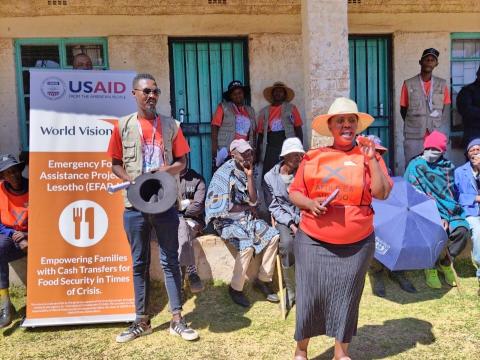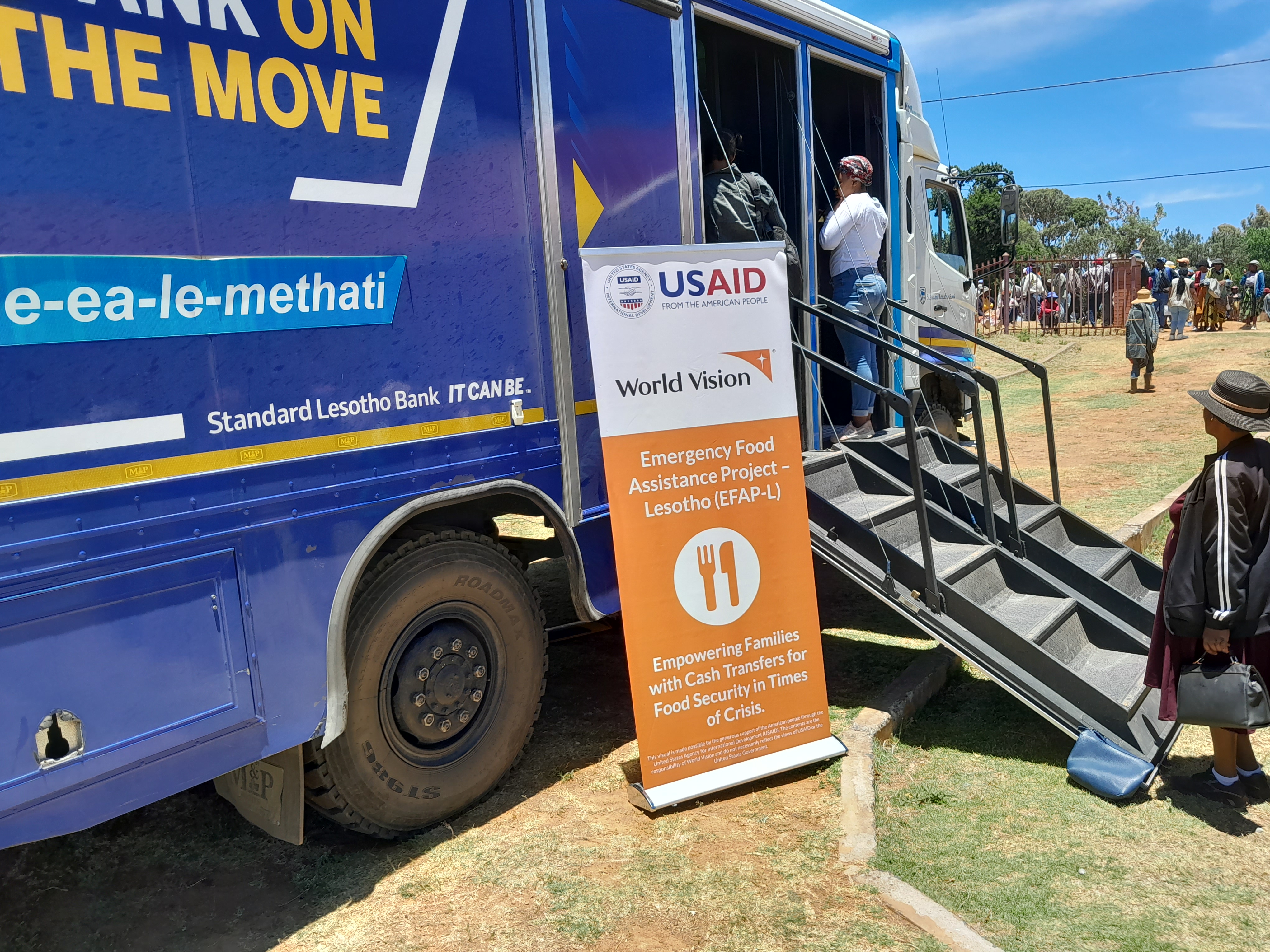World Vision Lesotho distributes cash assistance to 343 food-insecure households through the USAID funded Emergency Food Assistance Project - Lesotho

By: Tlali Tleketle, Emergency Food Assistance Project – Lesotho, Project Coordinator,
The devastating impacts of El Niño and other natural hazards continue to erode the resilience of vulnerable households in Lesotho, threatening their ability to secure adequate food and undermining productive capacities. According to the Lesotho Vulnerability Assessment Committee (LVAC), at least 700,000 Basotho were projected to face hunger from July 2024, with the situation expected to persist until March 2025. The El Niño-induced drought has intensified the vulnerabilities of already strained global food systems, creating a dire situation for Lesotho's most impoverished communities.
Food security is a fundamental human right, enshrined in the Lesotho Constitution. Despite this, the nation continues to grapple with significant barriers to achieving this right. Structural poverty, inequality, rising living costs, limited investment in agricultural development, and high dependency ratios in low-income households are among the key contributors to food insecurity. These factors are compounded by the ongoing climate crisis, which has led to severe water and land scarcity. Together, these challenges highlight the urgent need for coordinated interventions to ensure that no family goes hungry.
Recognizing this urgent need, World Vision Lesotho, with funding from the U.S. Agency for International development (USAID) - Bureau for Humanitarian Assistance (BHA), has launched the Emergency Food Assistance Project – Lesotho (EFAP-L). The project aims to provide lifesaving support to 2,595 drought-affected households across five community councils in Mafeteng, Mohale’s Hoek, and Quthing districts. Through Cash and Voucher Assistance (CVA), families are empowered to purchase food and meet their immediate needs, alleviating hunger and restoring their dignity.
A Lifeline for Vulnerable Families

On Friday, December 13, 2024, EFAP-L launched its first distribution, dispensing cash assistance to 343 food-insecure households in Matelile, Mafeteng. To ensure accessibility and efficiency, the project partnered with Standard Lesotho Bank’s mobile ATM services, enabling beneficiaries to redeem their entitlements on-site. The distribution also received support from the Lesotho Mounted Police Service (LMPS) to ensure safety and security onsite.
Chief Maama Seeiso of Ha Seeiso welcomed the gathering with heartfelt gratitude, describing World Vision and the American people as a "goose laying golden eggs" during a time of critical need. He acknowledged the profound impact of the assistance on his community, emphasizing that it provided much-needed relief to families struggling to survive the drought’s devastating effects.
One beneficiary, Mr. Tabo Tsóana, shared his story of hardship, illustrating the harsh realities of food insecurity. “As parents, we often found ourselves being harsh with our children simply because we could not provide for their basic needs. The famine in our homes left us frustrated and helpless,” he recounted. He expressed his profound gratitude to World Vision and USAID for the lifesaving support, noting that the assistance not only addressed immediate hunger but also contributed to reducing incidents of violence against children (VAC) and gender-based violence (GBV) linked to the stress of food insecurity.
Mr. Tsóana also praised the transparency and inclusivity of the beneficiary selection process, highlighting the active public participation and consideration for persons with disabilities. “We felt heard and included,” he remarked, a sentiment echoed by many in the community.”
Ensuring Nutritional Adequacy: The Minimum Food Basket
The cash assistance provided through EFAP-L project is designed to enable families to purchase items from the recommended minimum food basket. This basket includes essential food items that ensure a balanced diet and meet the nutritional needs of families, particularly children. Key items include maize meal, Bread flour, Cooking Oil, Salt, Sugar, Vegetables (cabbage and Tomatoes), Beans, Eggs, Milk, Fish, Tea/Coffee and fruit. These staples are crucial for maintaining health and energy levels, especially in children, who require proper nutrition for growth and development.
By equipping families with the financial means to secure these items, the project not only addresses immediate hunger but also promotes healthier eating habits. This approach helps mitigate the long-term effects of malnutrition and ensures that children have the energy and focus needed to thrive academically and socially.
Creating Pathways for Resilience
The success of the Matelile distribution marks the beginning of a larger intervention, with upcoming distributions planned for Mohale’s Hoek and Quthing districts. These distributions will target an additional 1,245 and 1,007 households, respectively. By injecting financial resources directly into the hands of those in need, the project is not only addressing immediate hunger but also stimulating local economies and fostering resilience against future shocks.
Building Sustainable Solutions
The cash transfers facilitated by EFAP-L serve as a critical stopgap measure, addressing immediate needs while paving the way for more sustainable solutions. However, the root causes of food insecurity in Lesotho require long-term strategies. Investments in agricultural development, climate-resilient farming practices, and social safety nets are essential to reduce dependency and build resilience in vulnerable communities. Population growth and urbanization add further pressure to an already strained agricultural system, underscoring the need for innovative and inclusive approaches to food production and distribution.
Food insecurity remains one of the most pressing challenges facing Lesotho. As the nation confronts the combined impacts of El Niño, climate change, and structural poverty, initiatives like EFAP-L provide hope to Basotho. The collaborative efforts of World Vision, USAID’s BHA, and local stakeholders are saving lives and demonstrating the power of partnership in addressing humanitarian crises.
World Vision International Lesotho calls upon all stakeholders including government, private sector actors, and civil society to intensify efforts to combat food insecurity. Together, we can ensure that no family goes hungry and that every Mosotho can live a life of dignity and opportunity, free from the shadow of hunger.
Acknowledgement:
This publication was produced by World Vision under the Emergency Food Assistance Project – Lesotho funded by the U.S. Agency for International Development